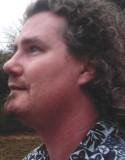"The Bay Area lights disappeared like some electronic billboard popping bulbs. Mostly in the hills. Ted watched trees spring from the ground as buildings vanished. Skyscrapers shrank and the Marin Bridge deconstructed. City Lights tarnished into a rickety, smelly shop where supposed Dharma bums flocked. The thickest, darkest air weighed over San Fran, smog trails easily traced from tail pipes and smoke stacks. How could the return of nature to this area feel so nasty?"
This idea came to me as I read about Japhy Ryder and Ray Smith (Kerouac's The Dharma Bums) leaving Japhy's bon voyage party to hike the trails in the area. Ray actually considers hiding out and camping on those wooded, spacious trails, and I laugh at how those same trails are now paved streets with cookie cutter homes. It's an uncomfortable laughter.
At any rate, this is the touch of authenticity I sought for my novella. And, how ironic that as nature reclaims the hills, smog reclaims the air. I think the paradox should serve my story well, although I'm not sure how.
Oh yeah, do you like how after ranting about the word "like," I use it in the first sentence. I want to create the effect of lights going out on a billboard, but how do I construct a sentence to convey this without resorting to simile?
24 May 2005
Subscribe to:
Post Comments (Atom)



2 comments:
Personally, I don't see a problem with that use of "like." Perhaps it's not the sentence that needs revision, but your feelings about simile.
IMHO,
RC
Yes, but here it doesn't seem to be a trite simile. The touch of the authentic as you call it helps. Besides what you were complaining about was in poetry when "like" is stung together and overly abused/used.
SS
Post a Comment